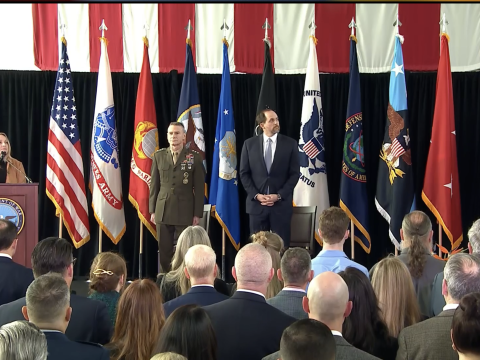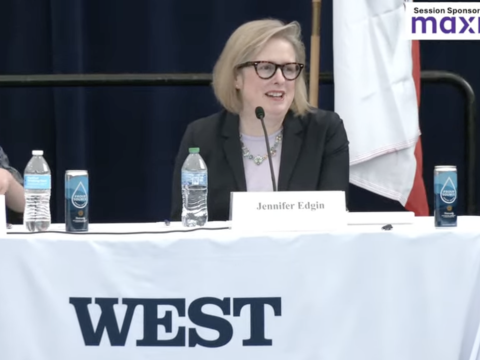U.S. Senate Intelligence Committee Leaders Discuss the Realities of Spying
The increasingly controversial Section 702 of the Foreign Intelligence Surveillance Act (FISA) is set to expire by the end of the year.
“I think maybe let’s stop being embarrassed by the fact that we spy, because every country in the world spies,” Sen. Marco Rubio (R-FL), vice chair U.S. Senate Select Committee on Intelligence, declared.
The statement received a loud round of applause on Thursday from the 2023 Intelligence & National Security Summit audience at the Gaylord National Resort in National Harbor, Maryland.
“The issue I think we face is two things: the first is confusion [about] FISA at large, and then 702 as a program,” Rubio continued.
Section 702 allows the government to surveil foreign persons outside the United States to protect the nation against adversarial threats. Contrary to common misinformation, the program cannot target U.S. persons or anyone within U.S. borders.
Sharing the stage with Rubio were Sen. Mark Warner (D-VA), U.S. Senate Select Committee on Intelligence chair, and Letitia Long, former director of the National Geospatial-Intelligence Agency, who moderated the “View from the Hill” plenary.
Warner echoed Rubio’s statement while drawing attention to the need for clarification on reforms made by executive decisions and agency leadership.
Privacy concerns surrounding the Beijing-based ByteDance Ltd. subsidiary TikTok have been a hot topic among politicians and American citizens alike. Social media influencers argue for the platform’s ability to generate financial success, while the U.S. government highlights TikTok’s privacy policies that allow for the collection of biometric data.
“If I went to the intelligence community and said, ‘I have a tool that will allow us to influence a massive number of Chinese citizens between the age of 14 and 30 and drive messages … that can influence the pressure they put on leaders,’ the intelligence community would say, ‘Let’s do it!’” Rubio told the audience.
Earlier this week, Reuters reported on TikTok’s aggressive $100 million lobbying powers in a successful attempt to decrease momentum to pass the Restrict Act. The legislation was introduced in March and could help “mitigate foreign threats to information and communications technologies products and services.”
“A company that, at the end of the day, is controlled by the CCP [Chinese Communist Party], by Chinese law, we ought to recognize it as concerning,” Warner stated.
“The thing that really pissed me off—and that's a technical term,” the Virginia senator joked, "the private equity industry wouldn’t even sit and take a meeting with us pre-COVID on China because they were making so much money.”
However, the post-COVID era has sparked an interest in understanding concerns around intellectual property theft.
@SenatorWarner and @SenMarcoRubio discuss national security matters at #intelsummit23, from spying to #AI, #china, maintaining a strong industrial base and more. pic.twitter.com/EiKsKeuJVr
— Sandra Jontz (@SandraJontz) July 13, 2023
In terms of the ever-changing world of artificial intelligence (AI), Warner believes guardrails are necessary, unlike when social media was first introduced.
“There are some senators that still can’t spell AI,” Warner added, highlighting how much more advanced adversarial nations like the Republic of China are on the matter.
Rubio added that AI’s fast-paced development makes fact-checking for misinformation and disinformation nearly impossible.
However, the more sophisticated the audience, the less room for bad-actor influence.
Sweden, used as an example by Rubio, dealt with enough Russian propaganda and interference for the nation’s public to learn when they are met with disinformation.
Information overload is certainly real, and educating the public through trusted sources is key.
"Both of us try to keep doing things bipartisan,” Warner added. “For the most majority of Americans who don't follow the ins and outs of who's up and down on a political issue, if it's bipartisan, that becomes code for ‘well, it must be in the country's interest,’ and I think that's important to reinforce.”




Comments